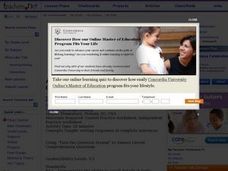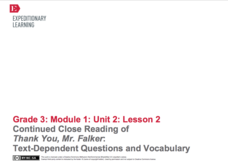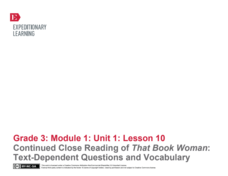Curated OER
Phineas Gage: Questioning Strategy
Focus on chapter two of Phineas Gage: A Gruesome but True Story About Brain Science with a questioning activity. After teaching and modeling several types of questions, learners work with partners and then independently to answer and...
Curated OER
Answering Literal Comprehension Questions
Practice using the Turn the Question Around (TQA) method to answer reading comprehension questions based on short narrative paragraphs. Instructions and materials are included for direct, guided, and independent instruction. Responses...
Curated OER
Questioning
Practice making predictions by looking at the cover of a book. You can use The Hungry Thing, as suggested here, or any other book you may be reading in class. Use the predictions to talk about good reading strategies. A chart is included...
Curated OER
Gary Paulsen's Canyons: Question the Author (QtA) Strategy
Gary Paulsen’s Canyons is the focus of an exercise that models how to read closely using a Questioning the Author (QtA) strategy. Complete directions for the strategy, which can be used with any text, are included in the richly-detailed...
Curated OER
Much Ado About Nothing: Bloom's Taxonomy Questioning Strategy
Do your class members’ questions lack depth? “Sigh no more . . .sigh no more.” Use a questioning strategy based on Bloom’s taxonomy to encourage readers to create questions that probe the themes of any text. The model discussion...
Curated OER
Dracula: Directed Reading Thinking Activity (DRTA)
“There are often dangers from snow and wolves and night.” Bram Stoker’s “Dracula’s Guest,” which may or may not have been the first chapter of the original Dracula manuscript, is the focus of a Directed Reading Thinking Activity (DRTA).
Curated OER
We love to Express Ourselves: Growing Toward Independence and Fluency
Reading with expression is an important component in developing fluency. Emerging readers learn different strategies for accomplishing this skill through the teacher's model reading of Earrings!. Partner practice is combined with...
Curated OER
Comprehension Strategy Instruction: Questioning
Providing learners with a solid armory of reading strategies is a good way to help them build better reading comprehension. The teacher will model how to use a questioning checklist to better understand what she is reading. Pupils will...
Curated OER
Walk Two Moons: Question Answer Relationship Strategy
Middle schoolers develop a strategy as they read excerpts from Walk Two Moons. Using question and answer relationship strategies class members bolster their reading comprehension as they appropriately identify and create questions.
EngageNY
Continued Close Reading of Rain School: Text-Dependent Questions and Vocabulary
The engaging story Rain School is further explored in the third lesson of a larger unit that explicitly teaches close reading skills by answering questions whose answers can only be found inside the text. Through teacher modeling and...
EngageNY
Continued Close Reading of Nasreen's Secret School: Discussions of Questions and Evidence
Third graders answer text-dependent questions of the story Nasreen's Secret School both independently and then collaboratively through using the carousel of questions strategy. This plan is the seventh instructional activity in a larger...
EngageNY
Continued Close Reading of Thank You, Mr. Falker: Text Dependent Questions and Vocabulary
In the second lesson plan in a series that revolves around the story, Thank You, Mr. Falker, learners practice the skill of answering direct questions from the text while using complete sentences. After a teacher-led review of how to...
EngageNY
Continued Close Reading of That Book Woman: Text-Dependent Questions and Vocabulary
Explicitly explained and delightfully detailed are two ways to describe this tenth lesson plan in a larger unit designed for the first few weeks of third grade. Learners continue to use and develop previously learned close reading...
EngageNY
Close Reading of That Book Woman: How Did People Access Books in Rural Areas of the United States?
For this ninth lesson plan in a larger beginning-of-the-year unit, close reading skills are used independently to find the gist of the story That Book Woman. Rereading for important details is the targeted skill to unlock a deeper...
EngageNY
Reading for Gist and Answering Text-Dependent Questions: Industrial Food Chain
Where do humans fall on the food chain? Scholars read about the Industrial Food Chain in The Omnivore’s Dilemma sections. They use word catchers to record unfamiliar words as they read and place sticky notes in the margins to annotate...
K12 Reader
Converting Fractions to Decimals
After examining a short article on fractions and decimals, readers draw information for the text to respond to a series of reading comprehension questions.
Texas Center for Learning Disabilities
Chapter 4 Teacher Guide and Student Log
"Piano Lessons," the fourth chapter in Tony Johnston's Any Small Goodness: A Novel of the Barrio provides an opportunity for class members to work in their study teams to develop and answer Level 1, Right There questions about the novel.
Curated OER
DR-TA Reading Strategy
Foster critical thinking skills by using the DR-TA Strategy with Jonathan Swift’s “A Modest Proposal.” Class members read portions of the essay, stop and discuss what is happening, make predictions based on evidence from the text, and...
Curated OER
Lesson Plan for Scaffolding Complex Texts
Enhance a class read-aloud of the children's story Hi! Fly Guy with this reading comprehension lesson plan. Children first listen as the teacher reads the story, stopping along the way to discuss any unfamiliar vocabulary. The book is...
EngageNY
Talking with My Peers: Carousel of Reading Superheroes Around the World
In many places in the world, people go to great lengths to get books to read. This beginning-of-the-year activity uses pictures of people reading in extraordinary situations to stimulate effective listening and speaking using the...
K12 Reader
It’s Elemental
This comprehension learning exercise provides readers with an article about basic matter and then asks them to use this information to respond to a series of comprehension questions.
K12 Reader
Meteorologists
Meteorologists and the tools they use are the subject of a reading comprehension learning exercise that asks kids to read the attached article and respond to a series of comprehension questions.
K12 Reader
Fungi Are Alive
They are alive even though they are neither plants or animals! Yes, fungi are the subject of this two-part comprehension worksheet. Kids read the article and then use information found there to respond to comprehension questions.
K12 Reader
Water Cycle
solid, liquid, and gas. The three different forms of water are the subject of the article used to assess reading comprehension. After reading the article, kids respond to a series of comprehension questions based on the text.
Other popular searches
- Questioning During Reading
- Questioning Reading
- Reading Questioning Strategy
- Questioning While Reading
- Questioning in Reading
- Questioning Reading Strategies

























